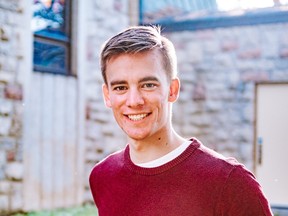Researcher archiving Sask. Twitter as part of COVID-19 history project
Upheaval since Elon Musk's takeover adds urgency to preserve records of what life was like in pandemic times.

Article content
It’s easy to picture historical research as piles of musty texts, scrolls and tomes. For a University of Saskatchewan Ph.D candidate, it happens 280 characters at a time.
Cameron is part of a team archiving the COVID-19 pandemic in Saskatchewan, and his focus is on archiving and analyzing Twitter posts. He said he’s trying to find and preserve anything that might be useful to future generations studying how people in Saskatchewan reacted to the pandemic. He spoke with Postmedia about the project.
Q: How valuable do you think Twitter is for measuring public attitudes during the pandemic?
A: The first thing is, you’re never going to get everything. We’re also partnered with some people with public health who did surveys, and when they were getting responses back for their health surveys, they were also finding issues with getting some harder-to-reach people. The responses said that basically 95 per cent of these people had at least two doses and 60, or 70 per cent actually, had the booster, which we know is not the case for the province of Saskatchewan.
I think some of what you get from Twitter, then, is this hesitancy that you don’t necessarily find when you’re going through these official surveys. These are people who are also hesitant to interact with authority. But there’s certainly a lot left out, as there always is. Now.
That’s one of the reasons we’re also looking at Facebook; we’re trying to see “how do these different platforms maybe have different conversations? What more can we get out of that?” And focusing, I think, on some of these activist groups especially helps give an idea of some of this top level of rhetoric as well. So there are significant limitations. But you can still do interesting things and figure out at least a bit of what’s going on.
Q: How has immersing yourself in so much social media affected you?
A: Whereas this is sort of focusing top-level on COVID, in my other project I’m looking at anti-vaccine activism since the 1980s. So, not only have I been dealing with present pandemic misinformation, I’ve also been dealing with some of the earlier Internet misinformation.
I have to say for me, I don’t know, I think it’s definitely gotten harder since 2018, when I first started. When I started then, it was maybe two per cent of people were truly anti-vaccine.
So, you read this stuff, and you’re like, “It’s kind of crazy.” But, one: I’m trying to work to understand it and unpack it. And, two: There are other important ways that we can get more people vaccinated, by increasing accessibility for those who actually do want their children vaccinated. Because there still are some barriers that exist for, especially, low-income people.
Q: Do you worry about the upheaval at Twitter following Elon Musk’s takeover?
A: I’m maybe not as pessimistic about the whole platform failing. But I do worry about the access we have. Twitter provides a lot of ability for academic researchers to collect large amounts of data. I do worry that if there’s no one working to maintain the systems that enable that, it could be gone. It has added some urgency for us to pull the data we need.
Questions and answers have been edited and condensed for clarity and length.
The news seems to be flying at us faster all the time. From COVID-19 updates to politics and crime and everything in between, it can be hard to keep up. With that in mind, the Saskatoon StarPhoenix has created an Afternoon Headlines newsletter that can be delivered daily to your inbox to help make sure you are up to date with the most vital news of the day. Click here to subscribe.









Postmedia is committed to maintaining a lively but civil forum for discussion. Please keep comments relevant and respectful. Comments may take up to an hour to appear on the site. You will receive an email if there is a reply to your comment, an update to a thread you follow or if a user you follow comments. Visit our Community Guidelines for more information.